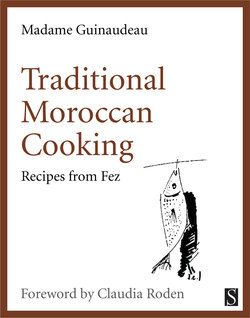Читать книгу Traditional Moroccan Cooking - Madame Guinaudeau - Страница 11
На сайте Литреса книга снята с продажи.
OLIVES
ОглавлениеThe hills surrounding Fez are covered with the grey green of olive trees. There is the festival of the olive harvest and the constant movement of vans on the road. The olive presses are at Bab Guissa, the gate leading north from the city, under the sour black heaps. The rancid smells of the souks. The dripping wooden jugs of the sahraoui donkey drivers. Restaurants offer their dishes of olives prepared with lemons. Vendors of fritters with their oily frying-pans. Food with an acid flavour that rasps the throat.
In Fez they have begun to cook with purified olive oil or groundnut oil and seldom use rancid butter. Believe me that nothing is better for preparing a good tagine than real olive oil with its fruity taste, which is indispensable in all Moroccan cooking.
When the moment comes for the inhabitants of Fez to take in their annual provisions it is traditional, in order to analyse the quality of the oil they have bought, to use a sample for a tagine with cardoons or maybe a nicely browned chicken. Tasting and sipping they will discover the degree of acidity and the olive’s subtle perfume.
BLACK OLIVES
The olives, when very ripe black and glistening, are rolled in rock salt in the proportion of two-thirds olives to one-third salt and put into a wicker basket with a heavy flat stone on top; a blackish water will emanate and the salt will penetrate to the fruit. At the end of two months the olives must be washed in clear water and put to dry on the terrace. They keep for a long time packed tightly in jars to avoid all contact with the air, and if dipped in oil may be preserved for many years.
